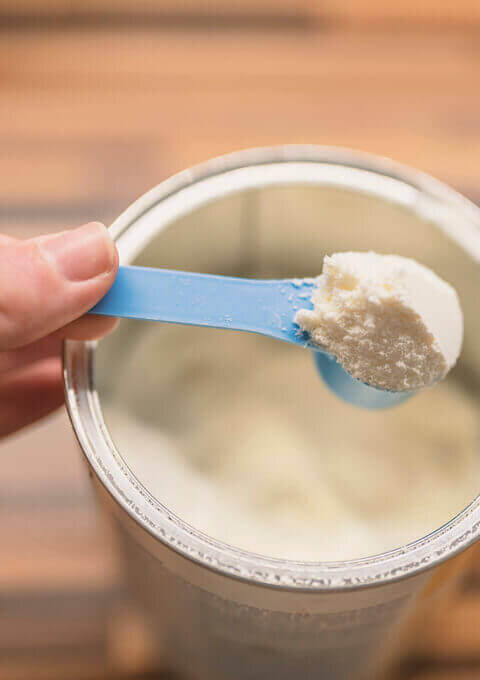Are you going to return to work soon and your baby doesn't want to drink formula from a bottle? Each feeding attempt ends with your baby turning its head after the first few sips? Find out why babies usually don't want to drink formula.
Why does my baby refuse to drink formula?
There can be several reasons. Much depends on the child's age as well as how it was fed so far. The problem is quite serious when it concerns newborns for whom milk is a basic meal. In a situation where the infant already eats solid food, you have, fortunately, an alternative. You can replace milk with other dairy products.
Your child does not like a bottle
If until now your baby has been breastfed, but you had to switch to baby formula for some reason, your baby may not want to drink it. Probably because it just prefers your breast over the bottle. The baby, feeling your scent, will expect you will latch it on as always. In this situation, it's a good idea to ask your grandmother or partner to give your baby a bottle with formula, because the baby won't associate it with natural breastfeeding.
You should change the bottle teat
It happens that the baby just doesn’t like the shape or material from which the teat is made. It may also be upset by the fact that milk flows from the bottle too quickly or too slowly. In such situations it is worth trying several types of bottles with different teats. It may turn out that thanks to that the child will be happy to drink formula.
If your child still refuses to drink from the bottle, you can try feeding it with a spoon or serving milk from a cup with a mouthpiece.
Your child doesn’t like the taste of formula
Each formula has a slightly different taste and it may happen that your child will not like the new formula, especially when it was only breastfed before. In this situation, new formula should be introduced gradually. First, mix a portion of the formula with the breast milk. Then, each day, change the proportions by reducing the amount of breast milk.
The problem may also appear when your child until now was only baby formula fed but now it must be switched to a follow-on formula. The problem may appear even if you choose a formula from the same producer. Here you can also apply the gradual transition method.
Your baby is going through a growth spurt
Aversion to formula may be associated with a growth spurt. Your baby acquiring new skills will be more interested in getting to know the world and what surrounds it than eating. It can happen that because of the excess of emotions and stimuli, it will simply forget that it is hungry. Fortunately, this is not a cause for concern. It is a transitional stage and after the growth spurt your child will certainly get its appetite back.
Your baby is teething and experience pain
During teething the baby often loses its appetite. The erupting teeth and swollen gums mean that your baby is not in the mood for anything. Its appetite decreases because every feeding causes it pain. In addition, warm formula or milk, increases the unpleasant symptoms of teething.
In this situation, the best method will be simply to wait through this difficult period. During teething you can give your baby a slightly cooler formula than usual. Try to be patient and do not get angry with your baby when it will be cranky and irritated. After the teething period, your baby will definitely be more eager to drink formula.
Your baby has health problems
Sometimes refusing to drink formula can be a symptom of a disease. Your child doesn't want to drink from the bottle, because it remembers that after each meal it feels bad. If your baby suddenly lost its appetite and had no problem with it before, it is not currently going through a growth spurt and it is not teething, it's a sign that something is wrong.
Observe how it behaves after a meal. Maybe it cries after each feeding because its stomach hurts. If an unknown rash has appeared, and the skin on the cheeks is red, it may mean intolerance to cow's milk proteins. Also, check if your child has a fever. Sometimes lack of appetite is the beginning of an infection. In both cases, see a doctor.
Your child wants to learn new flavours
There are children who, after introducing new foods to their diet, have liked new flavours so much that formula is no longer an attractive meal for them. This is quite normal, so there is no reason to worry if your child doesn’t want to drink formula, but eagerly eats all other meals.
To provide your child with all available nutrients, you can replace formula with another dairy meal in the form of yoghurt or porridge.
Your infant is straining, crying, but he can't poop. Are you looking for a way to bring him relief? Read our advice on baby’s constipation.
You have already chosen infant formula, the right bottles and good teats. Now you need to learn how to prepare milk for your baby. We can advise you on how to do it both during the day and at night.
Washing, boiling and sterilization of bottles and teats may seem cumbersome, but all these activities are very important for a baby's health. Remnants of milk are an excellent medium for bacteria, and baby's digestive system ...
"May he grow healthily", this is parent's greatest wish from the moment of baby's birth. Ensuring the baby eats and gains weight correctly is a challenge taken by mothers, and a very difficult and stressful problem when it ...
